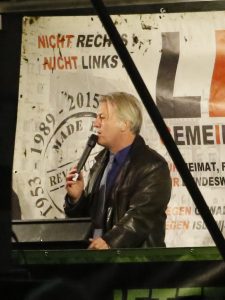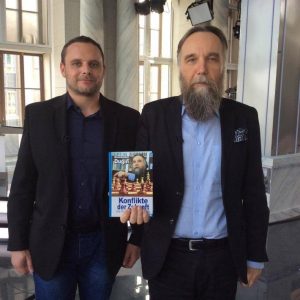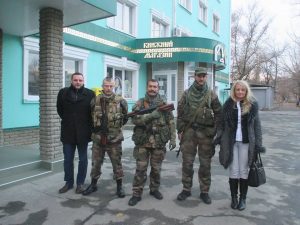[This article is also available in Spanish / al español, and in German / auf deutsch.]
“The last temptation is the greatest treason:
To do the right deed for the wrong reason.“
When T.S. Eliot wrote these lines in Murder in the Cathedral, he was thinking of the temptations of intellectual vanity and self-aggrandisement that potentially soil the motivation even of a religious martyr.
Eliot’s reflections on Archbishop Thomas Becket are worth thinking about, for anyone aspiring to political leadership – especially in a dissident cause such as racial nationalism – but today those lines came into my mind for other reasons, grounded in the grim state of 21st century European politics rather than 20th century poetry or mediaeval history.
Last week the German magazine Compact was banned by the Federal Republic’s interior minister, who cited alleged incitement of racial hatred (and all the usual ‘anti-woke crimes’) by the journal and its editor Jürgen Elsässer.
Yet, as has been pointed out by our friends at Dritte Weg (which is one of the very few genuine German nationalist organisations and remains untainted by the cowardice and treachery that pervades the ‘patriotic’ scene), this latest ban is more complicated than it seems.
To be clear: Compact and Jürgen Elsässer (unlike Dritte Weg) are not real nationalists or even real patriots. The magazine has built a large readership on the basis of American-style conspiracy theory and shallow posturing on quasi-nationalist themes. Until recently – unlike most of the nationalist scene in Germany – Compact had been unmolested by the authorities, lavishly funded, and widely distributed.
The most striking feature of Compact was/is its slavish devotion to Vladimir Putin. Under the guise of calls for ‘peace’, it has persistently peddled Kremlin propaganda. Of course in every nation there have always been genuine pacifists, whose stance must in some ways be respected even if one disagrees with them. But that isn’t where Elsässer and Compact are coming from. Nor are they rooted in any form of nationalist tradition.

Elsässer began his political life as a dedicated follower of communism and a proponent of the Moscow line, as it was during the 1970s and 1980s: anti-nazi, anti-racist, etc. During the 1990s he was among the founders of what (believe it or not) was proudly termed the ‘anti-German’ movement. This particular leftist faction argued that Germany had an inherent historical tendency towards ‘nazi’-style crimes, and therefore that Germany should never again be allowed to have a viable military or play any serious role in international affairs.
Elsässer’s ‘anti-German’ movement became notorious for turning up at commemorations of the 1945 Dresden terror bombing and chanting: “Bomber Harris, do it again!” For them, Germany couldn’t be punished severely enough, and however weak Germany became, it deserved to be degraded still further.
But – very significantly – this ‘anti-German’ tendency also took the form of opposing German participation in military operations in the former Yugoslavia. In retrospect (whatever else we might think about the Yugoslav civil war of that era) we can see the continuity: the likes of Elsässer consistently took the Kremlin line, whether during the dying decades of the Soviet Union, the corrupt Yeltsin era, or the neo-Stalinist Putin era.
It didn’t matter whether this line was ‘anti-nazi’, pro-Serb, or anti-Ukrainian: if it was the Kremlin line, it was faithfully followed by Elsässer’s gang.
During the 2000s, recognising the damage that had been inflicted on the credibility of the West (even internally) by the Iraq War, Putin’s intelligence service began to capitalise on ill-focused dissidence and conspiracy theorising among an audience of credulous online readers that was replacing traditional categories of ‘left’ and ‘right’.
Between 2009-2011, this Moscow line infiltrated the ‘right wing’ scene in Germany via (for example) two expensively produced magazines. Zuerst! had roots in genuine nationalist movements, but from 2011 it was edited by a Kremlin agent, Manuel Ochsenreiter. With financial backing from his Moscow masters (including the oligarch Konstantin Malofeev), Ochsenreiter travelled widely (especially in the Middle East) and networked with other nationalists – he was well-known for example to H&D‘s assistant editor and to our late comrade Richard Edmonds, and he worked in the European parliamentary office of an AfD politician.

Long suspected of being a Russian agent, Ochsenreiter’s career ended in 2019 when two Polish ‘far right’ activists whom he had commissioned to carry out a terrorist attack in the Ukrainian border city of Uzhhorod, were caught red-handed and confessed.
Though his lawyer issued the usual feeble denials, Ochsenreiter knew the game was up. Facing terrorist charges, he fled to Moscow and sought his masters’ protection. Now an embarrassment to Putin, Ochsenreiter died from a convenient heart attack in a Moscow hospital, aged 45. (The fact that the mainstream media, including the BBC, has occasionally reported the truth about Ochsenreiter and his fellow Russian agents doesn’t make it any less true! Shamefully, the mainstream media has told more truth about Putin than has most of the ‘alternative’ media: a sad symptom of our movement’s sickness.)
Zuerst! continues to peddle Moscow’s lies, but Compact (launched around the same time and with a less umbilical connection to the nationalist scene) became a far more influential Putinist mouthpiece. Until February this year, when certain outlets began refusing to stock it, Compact was widely available at mainstream news kiosks on the streets and railway stations of German towns and cities.
Naturally enough, Elsässer’s magazine latched onto every fashionable theme linked to the broadly defined dissident right, from anti-Islam movements such as PEGIDA to anti-vaccination and anti-lockdown demos, though without promoting anything that could be described as a coherent nationalist ideology (which is unsurprising given Elsässer’s own roots on the communist left).
Yet, as our friends at Dritte Weg have pointed out, the federal republic’s interior ministry does not seem to have relied on the treacherous Putinism of Elsässer and Compact as a basis for their banning.
Instead, the minister Nancy Faeser prattled on about ‘racism’ and ‘anti-semitism’ – all the usual ‘crimes’ against wokeness. She specifically stated that the authorities “would not allow ethnic definitions to be used to define who belongs to Germany and who does not.”
The message is clear – ethno-nationalism itself is to be criminalised, in fact made unconstitutional. (The irony being that Compact is not in any serious sense ethno-nationalist!)

In this respect, the action against Compact is an action against all of us, although the federal republic has a record of attempting such bans but then failing in the courts, and the same might happen this time.
Does this mean we should all be rallying around, despite clear and obvious political differences, and defending Compact against censorship?
No: there are two good reasons why we should oppose censorship, but also distance ourselves from Compact.
Firstly, there is no point making all the sacrifices and taking all the risks involved in nationalist political life if we are prepared to sacrifice our principles and ignore clear ideological dividing lines. Our enemy’s enemy is not necessarily our friend – which is why European racial nationalists didn’t march in support of ‘anti-Zionist’ Al-Qaeda or IS sympathisers when they were carted off to Guantanamo. The same applies to Putinists now, as applied to IS then: they are our enemy, whether or not they are also to any genuine extent our enemy’s enemy.
Secondly, as the case of Manuel Ochsenreiter demonstrates, if we allow our cause to be tainted by blatant treason, we are handing our rulers a stick to beat us with. Perhaps, as the collapse of the multiracial experiment becomes ever more obvious, the state will find some excuse to intern us.
But let’s not make it easy for them by associating our cause with the indefensible. Let’s not allow our cause to be dragged into the Putinist gutter.
European nationalists should stand against censorship; we should stand in support of our comrades’ right to free expression; but we should not endorse the anti-nationalist, anti-European traitors Jürgen Elsässer and Compact magazine.
